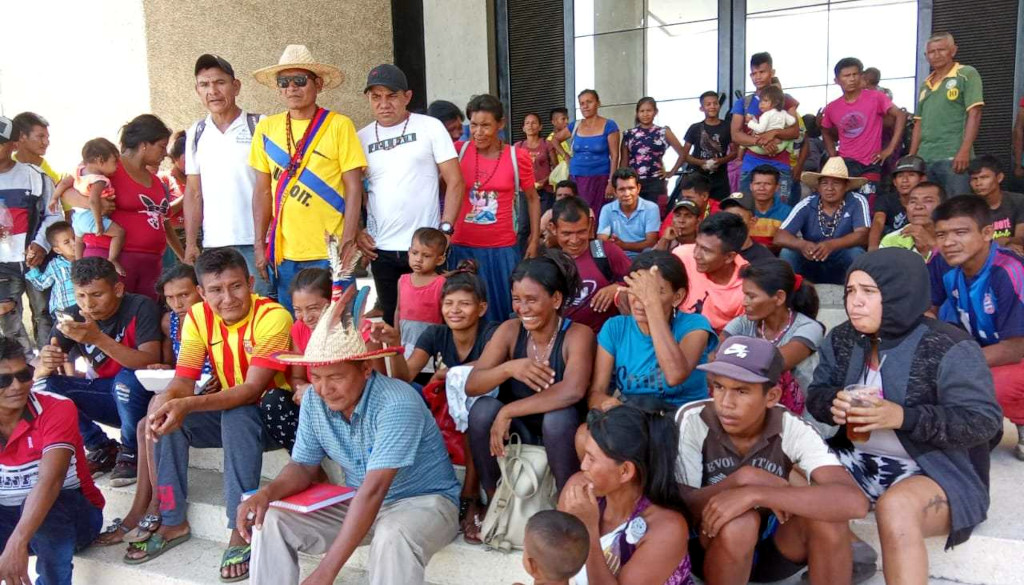Caracas. Indigenous Yukpa communities have denounced the repression by security forces and called for the release of three people arrested during recent protests in Zulia state.
On June 15, Zenaida Romero, her husband Alfonzo Ramos Romero and Francisco Romero were arrested after the Bolivarian National Police (PNB) attacked a group of Yukpas on the General Rafael Urdaneta Bridge over Lake Maracaibo and stopped them on their way to Caracas had.
Zenaida is the daughter of the historical Yukpa chief Sabino Romero, a key figure in the struggle for Yukpa lands in the Sierra de Perijá region. Romero was assassinated on March 3, 2013 by forces belonging to the landowning elites. Only the executing perpetrator has been convicted so far.
“The three were arbitrarily arrested while protesting for their right to travel to Caracas to sell their handicrafts,” Yukpa activist and advocate Sergio Zambrano said at a rally outside the Palace of Justice in Maracaibo, Zulia’s capital , to the local press.
Zambrano added that 17 Yukpas were injured and a three-month pregnant woman miscarried after the night’s attack. “In a kind of commando action, they moved [die Polizisten] Put on masks, turned off the bridge lights and attacked the yukpas who insisted on exercising their right to free movement.”
The lawyer further explained that those arrested are charged with disorderly conduct, conspiracy and possession of psychotropic substances. “All allegations are unfounded, rather the Yukpas were the ones attacked,” he said.
Indigenous leader Olegario Romero Romero clarified that his community was standing to one side of the road waiting to cross the bridge, and not, as police told media, blocking the bridge.
According to the Yukpas, police also confiscated 25,000 pieces of handicrafts (worth US$5 each), some of which they threw off the bridge, and three vehicles during the raid, according to the Yukpas. In addition, many people had their identity cards taken away. The indigenous community intends to demonstrate until the three arrested are released and their property is returned or paid for.
Lusbi Portillo, coordinator of Homo et Natura, a non-governmental organization for the rights of indigenous peoples in the state of Zulia, told Venezuelanalysis that in the past the Yukpas supported their communities through agricultural production, mainly avocados, bananas, yuca, ocumo, celery, but also meat and cheese.
“However, for almost a decade, the roads have been blocked because the nearby hills have slumped from the rains, making it impossible for the yukpas to transport their produce to the cities,” Portillo said.
The university professor stressed that despite numerous protests and letters, the government “never repaired the roads” or responded to calls for farm inputs, trucks and access to diesel fuel. As a result, the Yukpas have created an alternative source of income by selling their handicrafts, such as woven hats and handbags, in Caracas.
Last year, the Minister for Indigenous Peoples, Clara Vidal, started buying up goods from the Yukpas, but then abruptly canceled the agreement in May.
“When the Yukpas learned that the government would no longer buy their handicrafts, they decided to resume their trips to Caracas, but they were hampered at every checkpoint all the way from Sierra de Perijá,” Portillo explained. The security forces repeatedly attacked various Yukpa communities along the way.
“The Yukpa people live in the Sierra de Perijá region, in the municipality of Machiques, in the state of Zulia. The communities are grouped independently around the Apón, Negro, Yaza and Tukuko rivers. Those attacked on the bridge are from the Yaza River, where around 120 communities alone live,” he continued.
Two other yukpa groups from the Negro River and Tokuko River have also been attacked by police in recent days while en route to the capital, Maracaibo. They failed to cross the bridge and reach their destination.
Portillo told Venezuelanalysis that the three indigenous prisoners are expected to be released soon. Still, the activists, along with the Yukpa leaders, may take the case to the Attorney General’s Office and the United Nations office in Caracas. They are also working on an anti-racism campaign and are calling for the sacking of police chiefs involved in the repression.
